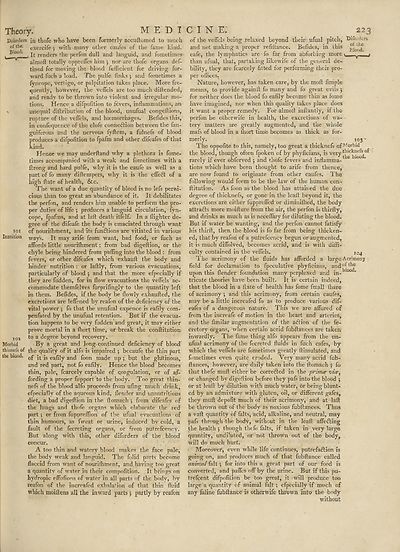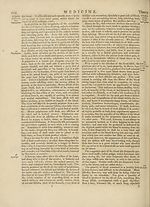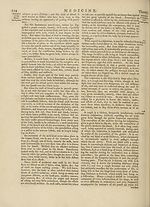Encyclopaedia Britannica, or, a Dictionary of arts, sciences, and miscellaneous literature : enlarged and improved. Illustrated with nearly six hundred engravings > Volume 13, MAT-MIC
(265) Page 223
Download files
Complete book:
Individual page:
Thumbnail gallery: Grid view | List view

Theory.
Diforders In thofe who have been formerly accuftomed to much
ot t*ie exercife *, with many other caufes of the fame kind.
L : jt renders the perfon dull and languid, and fometimes
almoft totally oppreffes him j nor are thofe organs def-
tined for moving the blood fufficient for driving for¬
ward fueh a load. The pulfe finks j and fometimes a
fyneope, vertigo, or palpitation takes place. More fre¬
quently, however, the veffels are too much diftended,
and ready to be thrown into violent and irregular mo¬
tions. Hence a difpofition to fevers, inflammations, an
' unequal diftribution of the blood, unufual congeflions,
rupture of the veffels, and haemorrhages. Befides this,
in confequence of the clofe connection between the fan-
guiferous and the nervous fyftem, a fulnefs of blood
produces a difpofition to fpafm and other difeafes of that
kind.
Hence we may underftand why a plethora is fome¬
times accompanied with a weak and fometimes with a
flrong and hard pulfe, why it is the caufe as well as a
part of fo many diftempers, why it is the effeft of a
high flate of health, &c.
The want of a due quantity of blood is no lefs perni¬
cious than too great an abundance of it. It debilitates
the perfon, and renders him unable to perform the pro¬
per duties of life ; produces a languid circulation, fyn-
cope, fpafms, and at laid death itfelf. In a flighter de¬
gree of the difeafe the body is emaciated through want
ioi of nourifhment, and its fundlions are vitiated in various
Inanition way's. It may arife from want, bad food, or fuch as
affords little nourifhment: from bad digeftion, or the
chyle being hindered from pafling into the blood : from
fevers, or other difeafes which exhauft the body and
hinder nutrition : or laftly, from various evacuations,
particularly of blood ; and that the more efpecially if
they are hidden, for in flow evacuations the veffels ac¬
commodate themfelves furprifingly to the quantity left
in them. Befides, if the body be flowly exhaufted, the
excretions are leffened by reafon of the deficiency of the
vital power ; fo that the unufual expence is eafily com-
penfated by the unufual retention. But if the evacua¬
tion happens to be very hidden and great, it may either
prove mortal in a fhort time, or break the conftitution
t0J to a degree beyond recovery.
Morbid By a great and long continued deficiency of blood
thinnefs of the quality of it alfo is impaired ; becaufe the thin part
the blood. c£ js ea{py anq foon made up ; but the gliltinous,
and red part, not fo eafily. Hence the blood becomes
thin, pale, fcarcely capable of coagulation, or of af¬
fording a proper fupport to the body. Too great thin¬
nefs of the blood alfo proceeds from ufing much drink,
efpecially of the aqueous kind, flender and unnutritious
diet, a bad digeflion in the ftomach ; from difeafes of
the lungs and thofe organs which elaborate the red
part; or from fupnrefiion of the ufual evacuations of
thin humours, as fweat or urine, induced bv cold, a
fault of the fecreting organs, or from putrefcency.
But along with this, other diforders of the blood
concur.
A too thin and watery blood makes the face pale,
the body weak and languid. The folid parts become
flaccid from want of nourilhment, and having too great
a quantity of rvater in their compofition. It btings on
hydropic effufioos of water in all parts of the body, by
reafon of the increafed exhalation of that thin fluid
which moiftens all the inwrard parts 5 partly by reafon
223
of the veffels being relaxed beyond their ufual pitch, Difoidcrs
and not making a proper refittance. Befidts, in this
cafe, the lymphatics are fo far from abforbing more ■ ^ _ 1
than ufual, that, partaking likewife of the general de¬
bility, they are fcarcely fitted for performing their pro¬
per offices.
Nature, however, has taken care, by the moft fimple
means, to provide againft fo many and fo great evils ;
for neither does the blood fo eafily become thin as lome
have imagined, nor when this quality takes place does
it want a proper remedy. For almoft inftantly, if the
perfon be otherwife in health, the excretions of wa¬
tery matters are greatly augmented, and the whole
mafs of blood in a ftiort time becomes as thick as for¬
merly. 103"
The oppofite to this, namely, too great a thicknefs of Morbid
the blood, though often fpoken of by phyficians, is very
rarely if ever obferved ; and thofe fevers and inflamma¬
tions'which have been thought to arife from thence,
are now found to originate from other caufes. The
following would feem to be the law of the human con¬
ftitution. As foon as the blood has attained the due
degree of thicknefs, or gone in the Icaft beyond it, the
excretions are either fuppreffed or diminifhed, the body
attrafts more moifture from the air, the perfon is thirfty,
and drinks as much as is neceftary for diluting the blood.
But if water be -wanting, and the perfon cannot fatisfy
his thirft, then the blood is fo far from being thicken¬
ed, that by reafon of a putrefcency begun or augmented,
it is much diffolved, becomes acrid, and is with diffi¬
culty contained in the veffels. 104
The acrimony of the fluids has afforded a large Acrimony
field for declamation to fpeculative pbyficians, and0^1^
upon this flender foundation many perplexed and in- 00 a
tricate theories have been built. It is certain indeed,
that the blood in a ftate of health has fome fmall {hare
of acrimony ; and this acrimony, from certain caufes,
may be a little increafed fo as to produce various dif¬
eafes of a dangerous nature. This we are affured of
from the inereafe of motion in the heart and arteries,
and the fimilar augmentation of the aflion of the fe-
cretory organs, when certain acrid fubftances are taken
inwardly. The fame thing alfo appears from the un¬
ufual acrimony of the fecreted fluids in fuch cafes, by
which the veffels are fometimes greatly ftimulated, and
fometimes even quite eroded. Very many acrid fub¬
ftances, however, are daily taken into the ftomaeh ; fo
that thefe muft either be correfted in the primer vice,
or changed by digeftion before they pafs into the blood ;
or at leafr by dilution with much water, or being blunt¬
ed by an admixture with gluten, oil, or different gafes,
they muft; depofit much of their acrimony, and at laft
be thrown out of the body as noxious fubftances. Thus
a vaft quantity of falts, acid, alkaline, and neutral, may
pafs through the body, without in the leaf! affecting
the health ; though thefe falts, if taken in very large
quantitv, undiluted, or not thrown out of the body,
will do much hurt.
Moreover, even while life continues, putrefatftion is
going on, and produces much of that fubftance called
animal fait ; for into this a great part of our food is
converted, and paffes off by the urine.. But if this pu-
trefeent difpofition be too great, it will produce too
large a quantity of animal fait ; efpecially if much of
any faline fubftance is otherwife thrown into the body
without
MEDICINE.
Diforders In thofe who have been formerly accuftomed to much
ot t*ie exercife *, with many other caufes of the fame kind.
L : jt renders the perfon dull and languid, and fometimes
almoft totally oppreffes him j nor are thofe organs def-
tined for moving the blood fufficient for driving for¬
ward fueh a load. The pulfe finks j and fometimes a
fyneope, vertigo, or palpitation takes place. More fre¬
quently, however, the veffels are too much diftended,
and ready to be thrown into violent and irregular mo¬
tions. Hence a difpofition to fevers, inflammations, an
' unequal diftribution of the blood, unufual congeflions,
rupture of the veffels, and haemorrhages. Befides this,
in confequence of the clofe connection between the fan-
guiferous and the nervous fyftem, a fulnefs of blood
produces a difpofition to fpafm and other difeafes of that
kind.
Hence we may underftand why a plethora is fome¬
times accompanied with a weak and fometimes with a
flrong and hard pulfe, why it is the caufe as well as a
part of fo many diftempers, why it is the effeft of a
high flate of health, &c.
The want of a due quantity of blood is no lefs perni¬
cious than too great an abundance of it. It debilitates
the perfon, and renders him unable to perform the pro¬
per duties of life ; produces a languid circulation, fyn-
cope, fpafms, and at laid death itfelf. In a flighter de¬
gree of the difeafe the body is emaciated through want
ioi of nourifhment, and its fundlions are vitiated in various
Inanition way's. It may arife from want, bad food, or fuch as
affords little nourifhment: from bad digeftion, or the
chyle being hindered from pafling into the blood : from
fevers, or other difeafes which exhauft the body and
hinder nutrition : or laftly, from various evacuations,
particularly of blood ; and that the more efpecially if
they are hidden, for in flow evacuations the veffels ac¬
commodate themfelves furprifingly to the quantity left
in them. Befides, if the body be flowly exhaufted, the
excretions are leffened by reafon of the deficiency of the
vital power ; fo that the unufual expence is eafily com-
penfated by the unufual retention. But if the evacua¬
tion happens to be very hidden and great, it may either
prove mortal in a fhort time, or break the conftitution
t0J to a degree beyond recovery.
Morbid By a great and long continued deficiency of blood
thinnefs of the quality of it alfo is impaired ; becaufe the thin part
the blood. c£ js ea{py anq foon made up ; but the gliltinous,
and red part, not fo eafily. Hence the blood becomes
thin, pale, fcarcely capable of coagulation, or of af¬
fording a proper fupport to the body. Too great thin¬
nefs of the blood alfo proceeds from ufing much drink,
efpecially of the aqueous kind, flender and unnutritious
diet, a bad digeflion in the ftomach ; from difeafes of
the lungs and thofe organs which elaborate the red
part; or from fupnrefiion of the ufual evacuations of
thin humours, as fweat or urine, induced bv cold, a
fault of the fecreting organs, or from putrefcency.
But along with this, other diforders of the blood
concur.
A too thin and watery blood makes the face pale,
the body weak and languid. The folid parts become
flaccid from want of nourilhment, and having too great
a quantity of rvater in their compofition. It btings on
hydropic effufioos of water in all parts of the body, by
reafon of the increafed exhalation of that thin fluid
which moiftens all the inwrard parts 5 partly by reafon
223
of the veffels being relaxed beyond their ufual pitch, Difoidcrs
and not making a proper refittance. Befidts, in this
cafe, the lymphatics are fo far from abforbing more ■ ^ _ 1
than ufual, that, partaking likewife of the general de¬
bility, they are fcarcely fitted for performing their pro¬
per offices.
Nature, however, has taken care, by the moft fimple
means, to provide againft fo many and fo great evils ;
for neither does the blood fo eafily become thin as lome
have imagined, nor when this quality takes place does
it want a proper remedy. For almoft inftantly, if the
perfon be otherwife in health, the excretions of wa¬
tery matters are greatly augmented, and the whole
mafs of blood in a ftiort time becomes as thick as for¬
merly. 103"
The oppofite to this, namely, too great a thicknefs of Morbid
the blood, though often fpoken of by phyficians, is very
rarely if ever obferved ; and thofe fevers and inflamma¬
tions'which have been thought to arife from thence,
are now found to originate from other caufes. The
following would feem to be the law of the human con¬
ftitution. As foon as the blood has attained the due
degree of thicknefs, or gone in the Icaft beyond it, the
excretions are either fuppreffed or diminifhed, the body
attrafts more moifture from the air, the perfon is thirfty,
and drinks as much as is neceftary for diluting the blood.
But if water be -wanting, and the perfon cannot fatisfy
his thirft, then the blood is fo far from being thicken¬
ed, that by reafon of a putrefcency begun or augmented,
it is much diffolved, becomes acrid, and is with diffi¬
culty contained in the veffels. 104
The acrimony of the fluids has afforded a large Acrimony
field for declamation to fpeculative pbyficians, and0^1^
upon this flender foundation many perplexed and in- 00 a
tricate theories have been built. It is certain indeed,
that the blood in a ftate of health has fome fmall {hare
of acrimony ; and this acrimony, from certain caufes,
may be a little increafed fo as to produce various dif¬
eafes of a dangerous nature. This we are affured of
from the inereafe of motion in the heart and arteries,
and the fimilar augmentation of the aflion of the fe-
cretory organs, when certain acrid fubftances are taken
inwardly. The fame thing alfo appears from the un¬
ufual acrimony of the fecreted fluids in fuch cafes, by
which the veffels are fometimes greatly ftimulated, and
fometimes even quite eroded. Very many acrid fub¬
ftances, however, are daily taken into the ftomaeh ; fo
that thefe muft either be correfted in the primer vice,
or changed by digeftion before they pafs into the blood ;
or at leafr by dilution with much water, or being blunt¬
ed by an admixture with gluten, oil, or different gafes,
they muft; depofit much of their acrimony, and at laft
be thrown out of the body as noxious fubftances. Thus
a vaft quantity of falts, acid, alkaline, and neutral, may
pafs through the body, without in the leaf! affecting
the health ; though thefe falts, if taken in very large
quantitv, undiluted, or not thrown out of the body,
will do much hurt.
Moreover, even while life continues, putrefatftion is
going on, and produces much of that fubftance called
animal fait ; for into this a great part of our food is
converted, and paffes off by the urine.. But if this pu-
trefeent difpofition be too great, it will produce too
large a quantity of animal fait ; efpecially if much of
any faline fubftance is otherwife thrown into the body
without
MEDICINE.
Set display mode to:
![]() Universal Viewer |
Universal Viewer | ![]() Mirador |
Large image | Transcription
Mirador |
Large image | Transcription
Images and transcriptions on this page, including medium image downloads, may be used under the Creative Commons Attribution 4.0 International Licence unless otherwise stated. ![]()
| Permanent URL | https://digital.nls.uk/192664607 |
|---|
| Attribution and copyright: |
|
|---|
| Description | Ten editions of 'Encyclopaedia Britannica', issued from 1768-1903, in 231 volumes. Originally issued in 100 weekly parts (3 volumes) between 1768 and 1771 by publishers: Colin Macfarquhar and Andrew Bell (Edinburgh); editor: William Smellie: engraver: Andrew Bell. Expanded editions in the 19th century featured more volumes and contributions from leading experts in their fields. Managed and published in Edinburgh up to the 9th edition (25 volumes, from 1875-1889); the 10th edition (1902-1903) re-issued the 9th edition, with 11 supplementary volumes. |
|---|---|
| Additional NLS resources: |
|

